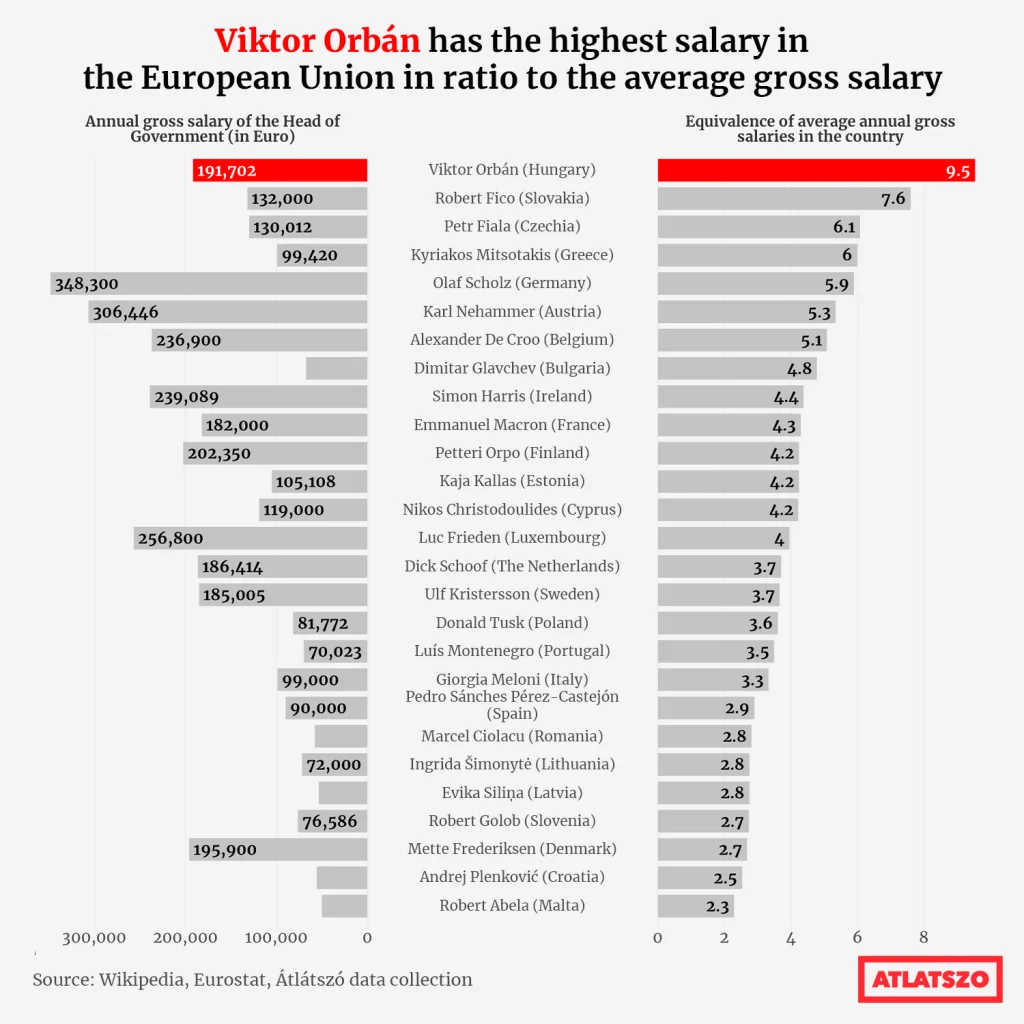Cover photo: Johanna Geron / Reuters / Forum 2024-07-24
Cover photo: Johanna Geron / Reuters / Forum 2024-07-24
In the European Union, Hungary’s head of government receives the highest salary relative to the country’s average gross salary. This year, Viktor Orbán’s monthly salary has increased to a gross €16,000 (HUF 6.3 million), which is 9.5 times the average Hungarian salary. Slovakia’s Robert Fico and the Czech Republic’s Petr Fiala are the second and third highest-paid in this comparison. In absolute terms, Orbán earns twice as much as the Spanish Prime Minister and three times as much as the Bulgarian Prime Minister.
In terms of salary alone, Viktor Orbán is not the highest-paid in the EU; seven European heads of government earn more than he does. The highest salary is that of the German Chancellor, Olaf Scholz, who earns €348,300 gross per year, or approximately €29,000 per month. However, this amount is not particularly high compared to other German public leaders. For example, the head of the German state railway company earned more than €2.2 million in 2022, about six times as much as the chancellor.
Scholz’s salary is still among the most disproportionate in the EU, with the German Chancellor earning 5.9 times the average German salary. The lowest salary is that of the Bulgarian Prime Minister, who earns €67,452 gross per year, roughly a third of Viktor Orbán’s salary. However, this is still high compared to the average Bulgarian salary, with the head of government earning 4.8 times as much as the average Bulgarian.
However, when compared to the average salary, Orbán’s salary ranks first, with a multiplier of almost 10.
The Hungarian Prime Minister is followed by his Slovak counterpart, Robert Fico, whose salary is 7.6 times the national average. In Slovakia, following an attempted assassination of Fico, a new law, which came into force on July 15, partially restricts freedom of assembly and provides a lifetime salary for heads of government who have served more than two full election cycles – this currently applies only to Fico.
In third place is Czech Prime Minister Petr Fiala, who, although earning almost as much as Fico, receives 6.1 times the average Czech salary. The smallest difference between the earnings of an average citizen and the head of government is in Malta, where the Prime Minister earns just 2.3 times the average gross salary. Croatia is not far behind: the Croatian head of government earns 2.5 times the average salary.
Orbán earns almost as much as the Danish Prime Minister, who earns just €4,200 more than him annually. However, in Denmark, the amount is significantly more proportional, at only 2.7 times the average Danish salary. A similar ratio can be observed in Slovenia, where the head of government earns 2.7 times the average. However, the gross annual salary of the Slovenian Prime Minister is €76,586, which is €115,000 less than Viktor Orbán’s.
The situation is similar in Poland: the salary of Donald Tusk is less than half of the Hungarian Prime Minister’s (€81,772), resulting in a more balanced ratio where the Polish Prime Minister earns 3.6 times the average salary.
In 20 out of the 27 EU Member States, the difference between the average salary and the salary of the head of government is less than a factor of five, making it notable that the difference in Hungary is nearly tenfold. Additionally, in 8 countries, the head of government earns less than three times the average salary. To put this in perspective, the gross salary of a Member of the European Parliament is €124,529 per year, which is €66,000 less than Orbán’s salary but more than that of the Italian, Spanish, or Estonian heads of government.
Of all the countries, the highest declared salary by far is that of the Prime Minister of Singapore, at almost €1.5 million per year. Next comes Hong Kong, followed by Switzerland, a European but non-EU country. The US president’s salary is a fixed $400,000 per year (approximately the same in euros), set by Congress in 2001. Germany ranks sixth in the world.

Viktor Orbán did not always earn this much. His salary as Prime Minister remained unchanged between 2010 and 2022, at €3,857 at today’s exchange rate (HUF 1,507,000 gross per month). This is not the only component of Orbán’s earnings. In addition to his honorarium, he also receives a salary as an MP, which has been increased multiple times since 2010. Until 2014, it was €600 (HUF 231,900), but after the parliamentary elections that year, it was significantly increased. The basic salary of an MP more than tripled to €1,914 per month (HUF 747,878).
After the next election in 2018, this amount was increased again to €2,280 per month (HUF 891,000). Additionally, a law was enacted that year to link MPs’ salaries to the average income of the population, setting it at three times the average gross salary. The law also states that if the average salary were to fall, the previous year’s figure would be used to calculate MPs’ salaries.
However, in 2022, not only were MPs’ salaries significantly increased, but the Prime Minister’s salary was also raised to the same level as the Speaker’s, to €8,960 gross (HUF 3.5 million). Thus, in 2022, the Prime Minister’s total salary became €12,288 (HUF 4.8 million).
As the average gross salary in 2023 was €1,461 (HUF 571,000), the basic monthly salary of MPs increased to €4,383 (HUF 1.71 million) in 2024. However, Viktor Orbán’s total salary is more than 3.5 times higher. Combining his MP’s salary and the Prime Minister’s salary, it totaled €16,128 (HUF 6.3 million) by 2024. As a result, he now earns almost 10 times more than the average Hungarian worker.
Translated by Krisztián Szabó
The original, Hungarian version of this story was written by Dávid Háberman and Krisztián Szabó and can be found on atlatszo.hu.
Subscribe to Goulash, our original VSquare newsletter that delivers the best investigative journalism from Central Europe straight to your inbox!







